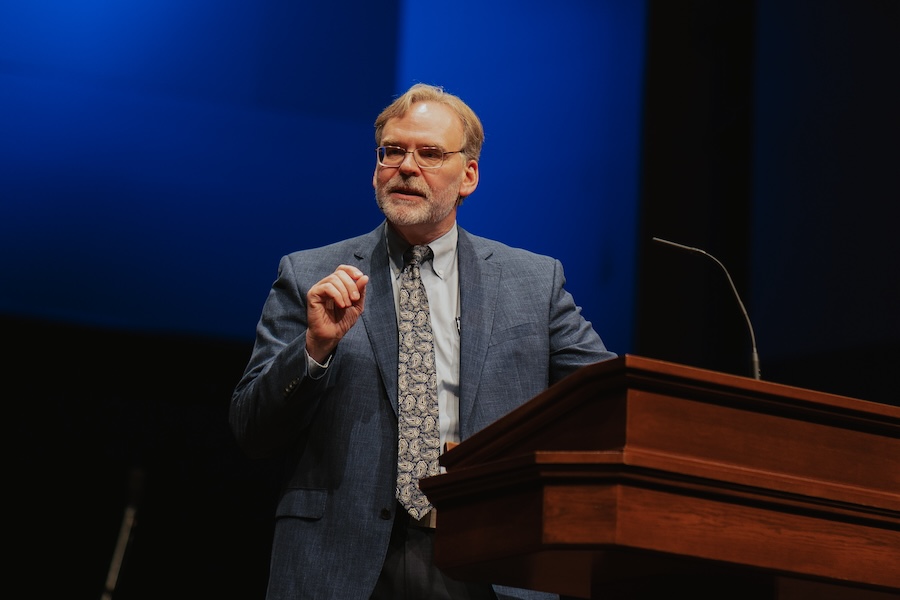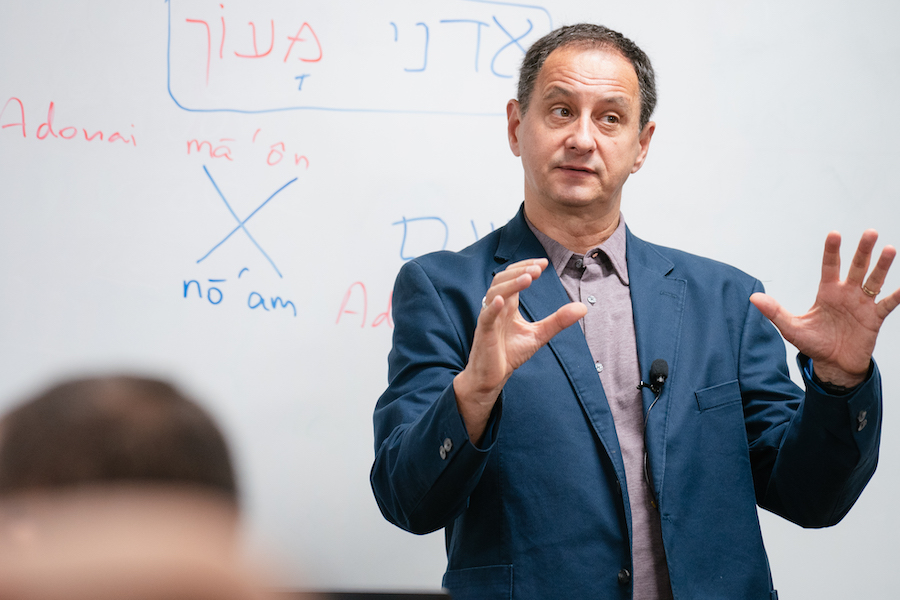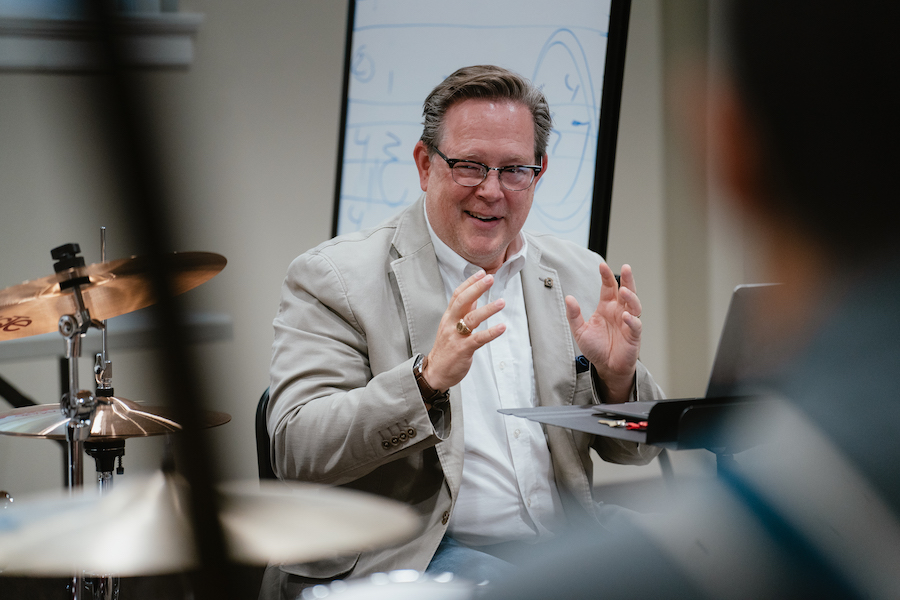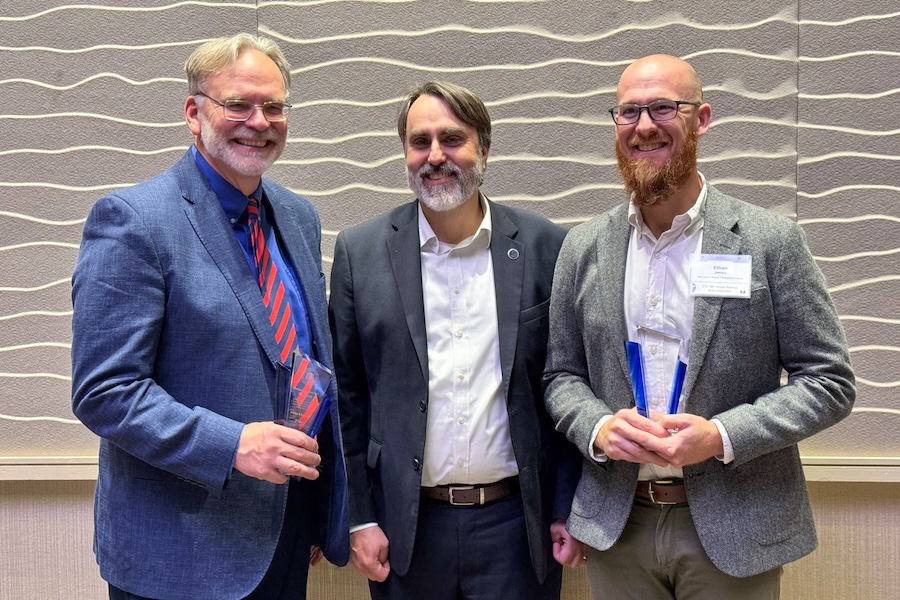McKinney uses variety of interests to help students appreciate value of history
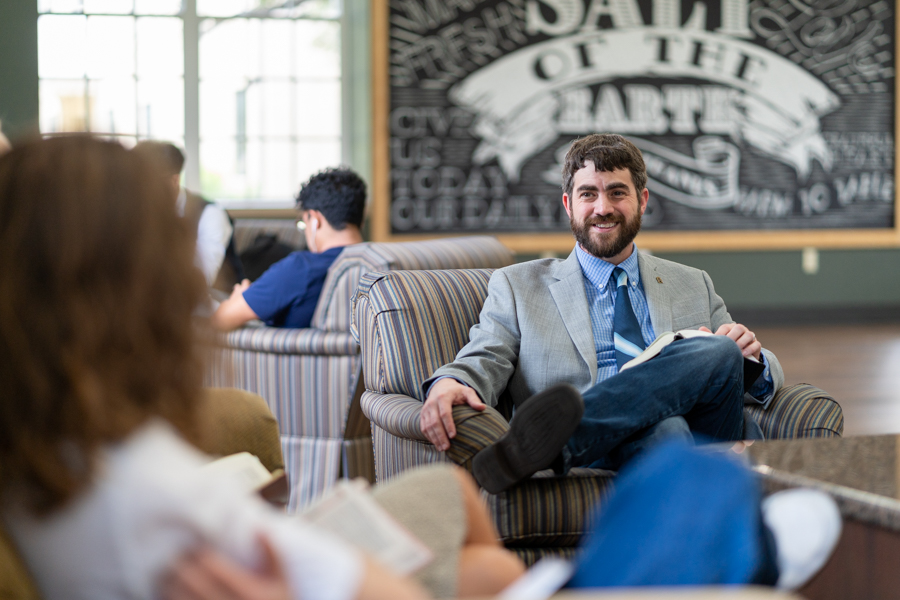
To say that Blake McKinney, assistant professor of history and humanities at Texas Baptist College, is a “Renaissance man,” is not a reference to history, but about his wide and varied knowledge about many things, including his beloved Chicago Cubs, Alabama football, music, movies, travel, latte coffee, and, of course, church history.
“I have many interests, and you can see stages in my life,” McKinney said, waving his hand at his library and décor in his office.
“I used to joke about the Cubs because they went from 1908 to 2016 not winning the World Series. The Lord said, ‘Blessed are those who believe without seeing,’ and the Cubs fans are the most blessed of all fans,” McKinney said. He stopped using that analogy after they won the World Series in 2016, but still he seeks to intertwine baseball and the Bible in his lessons. “There’s just something beautiful about a sport where a 66 percent failure rate is really good. If you bat 0.333, you are a fantastic player,” McKinney said.

Blake McKinney, assistant professor of history and humanities at Texas Baptist College.
While there are some things that do not interest McKinney at all—social media for instance—he said he tries to find common references to help students understand the spiritual truths and historical significances.
While he takes his subject very seriously, he doesn’t take himself too seriously, saying, “I tell students, you can Google and find somebody with a better accent talking about church history than me.” Instead, when students come to class, McKinney’s goal is not an information dump but to “humanize history. It’s not just memorizing dates.”
Part of McKinney’s eclectic background includes earning both his Master of Arts (Modern European History) and Doctor of Philosophy (European and Religious History), not from a Christian institution, but rather from the University of Alabama in 2015 and 2021, respectively, a decision he said he is glad he made. “As long as I did good work, they didn’t really care that I was a Christian.”

Blake McKinney tries to not take himself too seriously when teaching.
Even though he earned his Master of Divinity from Southern Baptist Theological Seminary in Louisville, Kentucky, in 2011, “having not done any history degrees at all, I had to get a M.A. before a Ph.D. It was a great environment and great support for research,” McKinney said. Earning the degrees included several trips to Germany where he did extensive research in the country’s state and church archives.
“Timothy George used to start off all of his church history classes with, ‘I’m here to prove to you that people existed between Jesus and your grandma, and it matters,’” McKinney said, quoting the founding dean of Beeson Divinity School at Samford University, and recipient of Southwestern Seminary’s Lifetime Academic Achievement Award in 2021. McKinney said he wants to communicate to the students the importance of church history.
When invited to come to Texas Baptist College after completing his Ph.D., McKinney said he “leapt at the opportunity to teach here and it’s been a real joy.” Looking at his journey from his hometown in Middle Tennessee to Fort Worth, Texas, McKinney isn’t really surprised. Many of his Christian influencers were Southwestern Seminary graduates, including several at his home church, Long Hollow Baptist Church in Hendersonville, Tennessee, like Ronnie Hill, an evangelist who came to his church and resulted in his acceptance of Christ; his youth pastor, Lance Taylor, who baptized him; and his pastor, David Landrith, who “discipled and shepherded” McKinney.

Blake McKinney “leapt at the opportunity” to teach at Texas Baptist College.
When he went to Union University, where he would earn a double major in music and Christian studies, “It seemed that half or even the majority of my music professors were Southwestern people,” McKinney surmised.
It was a class at Union University, taught by George Guthrie, a two-time SWBTS alumnus and the first recipient of Southwestern Seminary’s W. Curtis Vaughan Award in 2021, “that the Lord really made clear that my calling was serving the church through academics,” McKinney said. He went on to Southern Baptist Theological Seminary in Louisville, Kentucky from 2008-2011, where he earned his Master of Divinity.
Perhaps related to his diverse experience, interest, and education, McKinney said that “one of the biggest goals I have for all of my students in all of my classes is ‘I want you to be able to disagree without being disagreeable. Can you find that which is essential to the faith and be friends with someone who disagrees with you on things that are not essential?’”
According to one of his students, Bruce Mikel, a Bachelor of Arts in Christian Studies major from Azle, Texas, McKinney’s efforts to impact present ministry with the lessons from the past is working. Mikel said one lesson he has learned from McKinney is that “church history, and … Baptist history, is filled with men and women who have done really good things and … full of men and women who got things wrong.”
Mikel adds that McKinney and the rest of the “faculty of TBC and Southwestern are the real heroes,” and specifically said that McKinney’s prayers are “theologically rich,” with a “depth and warmth that is hard to find.”
Shaelee Riggins, a student earning a bachelor’s and master’s degree in TBC’s 5-year-degree program, echoes an appreciation of McKinney’s classes, which are both “Christ-centered and prayer-driven,” she said. “He daily reminds his students that the grade does not define who you are, but that our identity is solely found in Christ. Taking classes with Dr. McKinney will show you the importance of prayer, influence how you read Scripture, and better equip you to live your life for Christ.”

Blake McKinney sees himself as a “disciple” more than a teacher.
The admiration between students and McKinney is mutual. “I am encouraged by our students,” he said. “I don’t see them parroting the nonsense. Our students love the Lord, they are sharing the Gospel in apartment complexes and in prisons. The students are here to soak up the Word, and then go share it.”
McKinney is intentional in not just teaching information. “I see my role as discipler. Yes, I teach them about church history, literature, and these great books, but I get the joy to prepare them for the trials that are coming,” McKinney said, with one of his classes being on theodicy, vindicating a good, providential God and the existence of evil. “When I teach a class on the problem of evil, I get to say, ‘Let’s remind ourselves of who God is while we are in the light, so that when we are in the dark, we know what the light was.’”
McKinney said one of his goals is for his students to “love church history and not because people there were smarter or more godly but they realize they are not alone. They are a part of the great cloud of witnesses,” McKinney said. “I want, when they leave [my class], they leave with a collection of people and writings that they love.”
